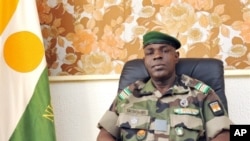A Cabinet minister in Niger’s military government denied opposition accusations that the junta’s recent appointments to several state institutions are discriminatory.
Education Minister Laouali Dan Dah told VOA that the junta authorized ministers to choose the best qualified candidates to fill positions in their respective ministries.
“As you know, this government is not a political government because when the people were appointed in the government, it was not due to their political partners. It was due to their capacities to [bring] change in the policy of Niger. So, the accusation that you hear about the government [isn’t true],” he said.
Several Niger opposition groups say the government is being run by “relatives, friends and allies.”
But, Minister Dan Dah said the junta will continue with efforts to strengthen Niger’s democracy.
“I think that it is difficult to not give people the opportunity to speak. If people speak as they want, it means that really, in Niger, you have democracy. But, what is difficult to understand is the accusation of discrimination,” Dah said.
He also said the junta has set up an independent body to address concerns of the opposition ahead of the presidential election scheduled for 26 December.
But, opposition groups say the government has failed to consult with them and has often taken unilateral decisions despite repeated promises of transparency and the exchange of ideas.
Minister Dan Dah said the junta is committed to resolving opposition concerns.
“We have a political circle of contact between government and political parties. I think that it is better for political leaders or civil society leaders to use this political circle in order to have real contact, real dialogue with the government about their concerns. I think that this is better,” Dah said.
Niger’s junta, or the Supreme Council for the Restoration of Democracy (CSRD), seized power in February after overthrowing long-time President Mamadou Tandja. Mr. Tandja came under international criticism after amending the constitution that removed term limits.
Shortly after taking over, the junta said in a statement that it was forced to intervene militarily due to what it said was the “increased socio-political tension in which our country had been plunged into because of the constitutional manipulation which led to the destruction of the democratic institutions and the Fifth Republic.”




